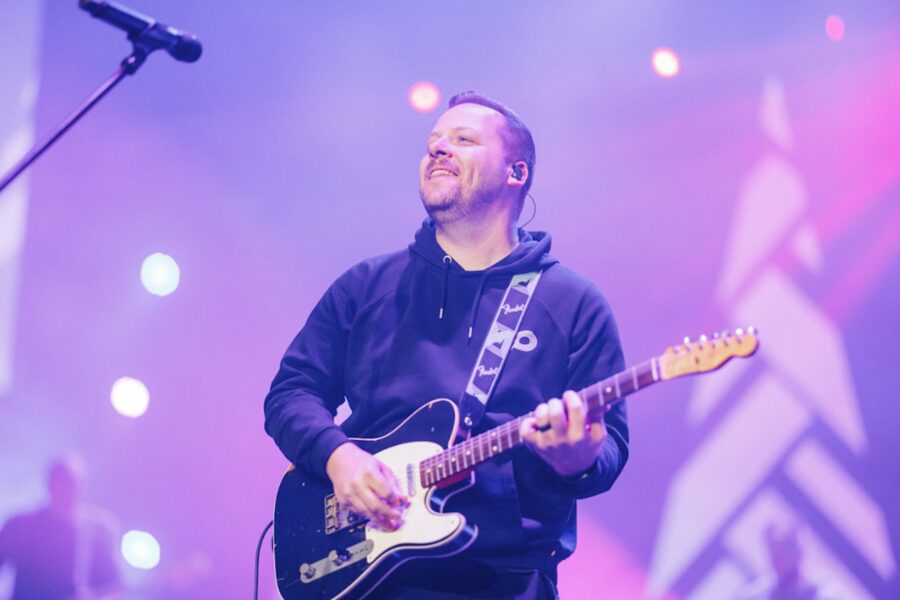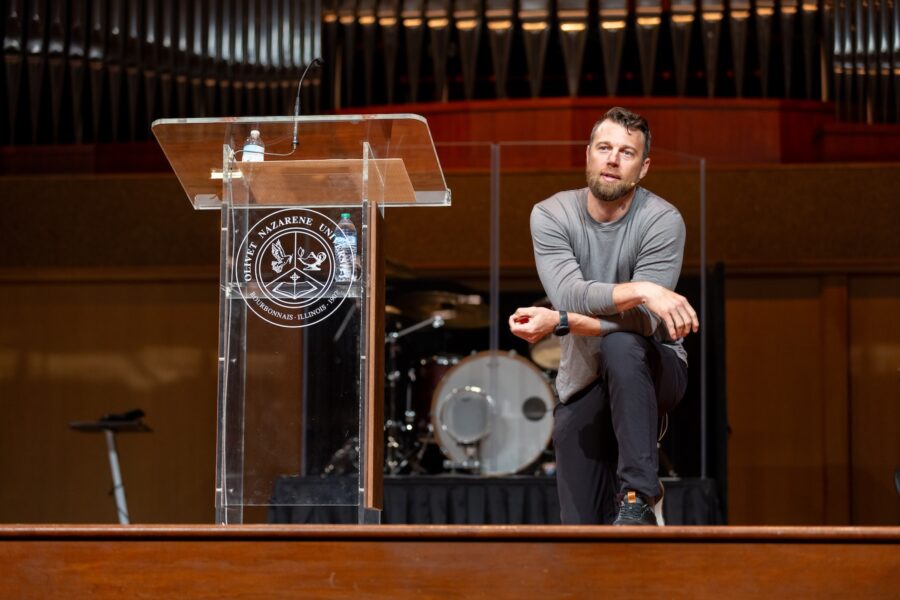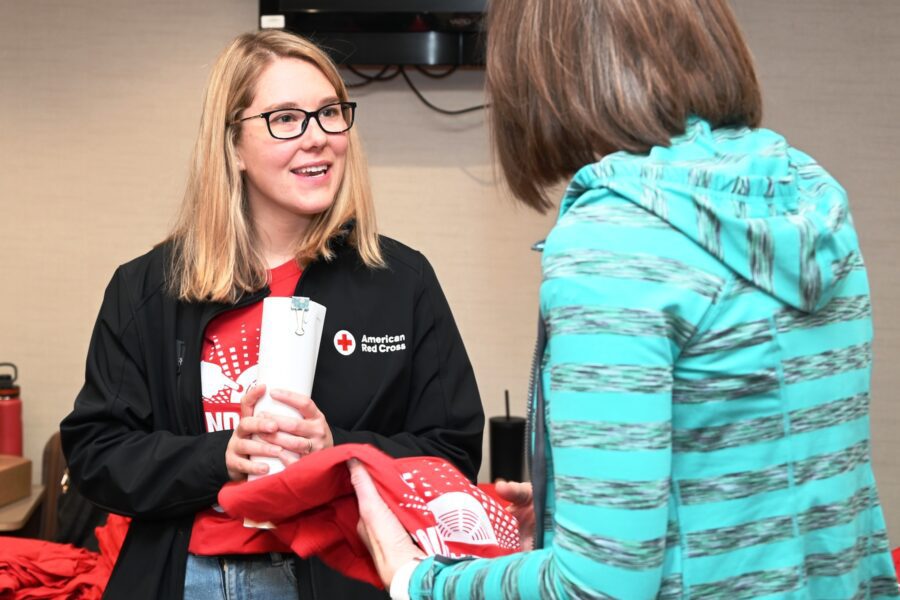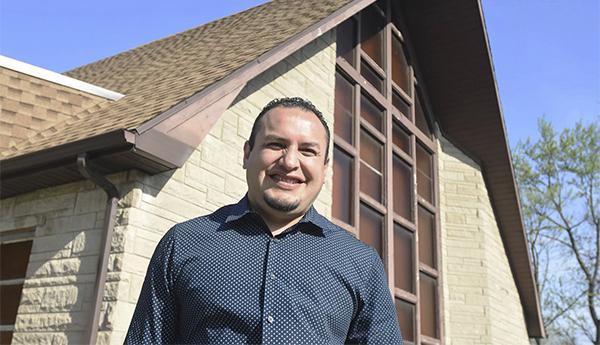
Bringing neighbors home
After troubled youth, pastor helps others discover their place
by Steve Warden, The Journal Gazette, Fort Wayne, Indiana
“Quincy.”
As Javier Mondragon almost whispers the name, sadness all but consumes the dark eyes that express a faraway gaze, even though he sits in his small office within Many Nations Church of the Nazarene.
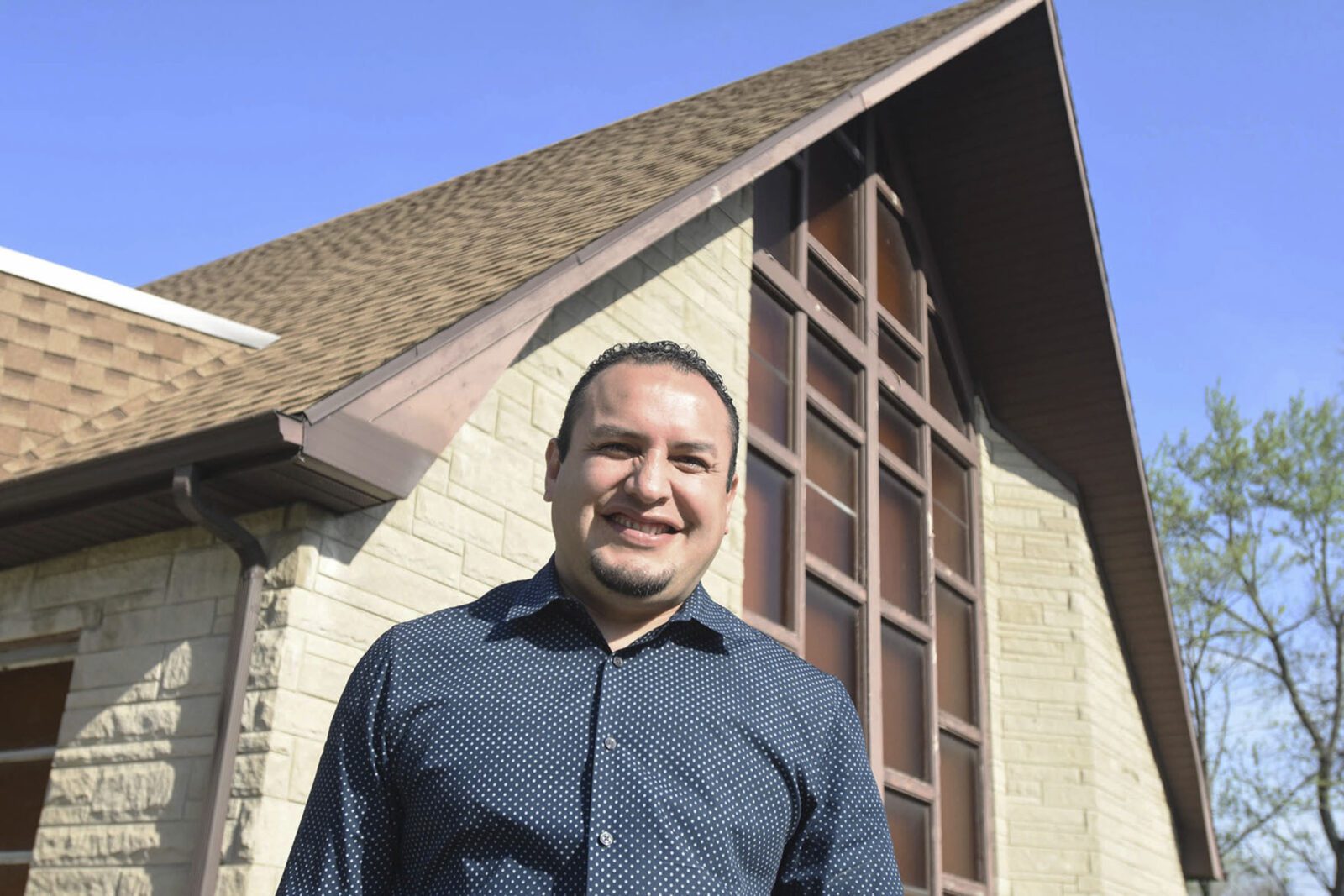
Quincy, he explains, was a friendly little 9-year-old boy on a bike who lived in the Mount Vernon Park neighborhood on Fort Wayne’s southeast side. At least, he was 9 back in the summer of 2008. Now, Mondragon figures, he must be 17 or 18, although he can’t say for sure because Quincy, whose last name he never knew, moved away long ago with his mother, and nobody knows what happened to them.
It isn’t unique for families to seemingly vanish overnight, Mondragon says. Many of the 600 or so single-story houses that sit side by side in the area bordered by Pettit Avenue, Anthony Boulevard, Paulding Road and Hanna Street are rentals.
Some homes and the patches of grass in front weren’t maintained by the people who lived there. Some of the landlords didn’t care. The eventual result was many homes were abandoned, ignored, vandalized. They became drug houses and places for gangs to congregate.
This is what Mondragon saw when he took the job at Many Nations Church in the heart of the neighborhood on Fairfax Avenue. His home – the church’s parsonage – is directly next door.
Since he and his wife wanted to raise a family, the young pastor – who saw enough of his own poverty with a single mother and five siblings growing up in what he described as a 10-by-20-foot home in Mexico – didn’t want the same for his children.
“My oldest sister was out of the house, so there were five kids and my mother in one room,” Mondragon recalls. “For our bedroom, we would hang sheets from the ceiling. We only had two beds and a mattress we would put on the floor. That’s all we had.”
Mondragon’s oldest brother was also frequently absent, primarily because he was in and out of prison. Nicknamed Chancla (meaning “sandal” in Spanish), the brother was a gang leader. And since he was Chancla’s little brother, 12-year-old Javier was more than welcome.
“They embraced me, basically,” Mondragon says. “I started to deliver drugs, to begin. I was delivering packages here and there. I started to rob. … We’d find women, mostly, with necklaces, and we would pull them and run, and sell it to places where they would buy gold. Just whatever we found to do, we would do.”
From age 12 to 17, Javier was following in his oldest brother’s footsteps. Although he had been thrown out of high school in the 10th grade, he made his living on the streets. But his life would soon change – the type of drastic transformation Mondragon yearns to see for others, not only as the pastor of his church but also as founder of Bridge of Grace Ministry.
An offshoot of his Many Nations Church of the Nazarene, Bridge of Grace organizes, oversees, finances and finds volunteers to help change the culture and the physical presence of the neighborhood. Four homes in need of repair, all abandoned at one point, have been or are being renovated through volunteer labor and donations.
‘Miracle in my life’
Still out of school, still involved in his gang, Javier was 17 when his mother died at the age of 54. After the funeral, another older brother, Marcelino, talked to Javier about his own life and where it was headed.
“He knew what I was doing and that I was involved, but he kind of encouraged me,” Mondragon says. “He said, ‘When are you going to stop?’ I told him I have tried. I tried to stop and didn’t want to do those things any more. ‘I feel tired of what I’m doing. I know I’m going to be dead one day, or I’m going to prison for the rest of my life. I might kill someone. I definitely want to stop, but I don’t know how. What should I do?’ ”
First, Marcelino encouraged him to get away from the gang that also served as his family for five years and to join him in the United States, in Arkansas. Several weeks later, Marcelino had another request of Javier: Would he come to a concert?
“Oh, they had music,” Mondragon says with a smile. “But it was a Billy Graham crusade. That’s how they got a lot of people to go, by telling them it’s a music concert.”
But in an outdoor field near Springdale, Arkansas, young Javier listened.
“I remember closing my eyes and saying, ‘God, I don’t know if you exist, but if you exist, I want to change. And here I am if you can help me.’ That’s all I said. He did a miracle in my life. I didn’t need any rehab. I didn’t need anything. I did feel something. I was crying and crying, and I didn’t know why. I just knew something happened in my life that day.”
In two years, Mondragon would take the GED test and earn a high school equivalency diploma. The Arkansas certificate not only has a proud place in his office, hanging above his Olivet Nazarene college degree, but Mondragon made sure to tape “GED” on the frame.
“My wife thinks I’m crazy,” he says. “If I didn’t put the ‘GED’ on it, it wouldn’t be as important because of the kids in the neighborhood. They think, ‘I’m done. I don’t need to go to high school.’ I tell them, ‘Come over here. You need to get your GED.’ ”
Because he knows what it’s like to be poor, to have a single mother, to be with a gang and run afoul of the law, to be confused, Mondragon is convinced God chose him to come to these few square blocks in southeast Fort Wayne.
“Maybe the reason is I can relate to a lot of issues that are happening here,” he says.
Defined by home
Twenty-five years have passed since he was a 12-year-old gang member, delivering packages of drugs and stealing gold from strangers. And briefly, as though he can see it all over again, Mondragon finds himself back in his Mexico neighborhood.
“Housing environment affects you so much emotionally,” he says. “Every time I would walk out the door and look around and look around my neighborhood, I felt like, ‘That’s me.’ When I look around, that’s me. And that’s going to be me for the rest of my life. I am no one. I am nobody. There’s no hope for me.’
“When we moved here in 2008 – when we had that recession – it was terrible. We had a lot of empty homes. And one of the things I realized is that my kids now are growing up. I didn’t want my kids to feel the same way I felt, that ‘This is me.’ But not just my kids. Everybody wants the same for their kids. That’s why we’re doing community organization and community development. It affects you so much. It affects your mentality. It affects you emotionally. It’s the identity of who you are.”
Then he recalls Quincy, and a particular summer day when Javier was grilling hot dogs in his backyard.
“He sees the smoke, so he stops by my yard,” says Javier, who offers the boy a hot dog. “We were sitting, and I was talking to him, and I asked, ‘Why are you always on the street?’ I said, ‘I see you every day on the street. … He didn’t say anything. ‘Oh, I’m just playing.’
“More kids came after him. One day I went to Sam’s (Club) and got a lot of hot dogs. Instead of putting my grill in the back, I put it in the front. I tell Quincy, ‘Quincy, go bring your friends.’ Everybody ate some hot dogs and left, and I talked to Quincy again. … He called me ‘Father.’
“He said, ‘Father, do you remember when you asked me the other day about why I’m always on the street?’ And I said, ‘Yeah.’ He said, ‘Well, my mom goes to work at 8 in the morning, so she tells me to get out of the house and she locks the door, because she’s afraid that I will bring my friends when she’s not home.
“She doesn’t come back until 5, 5:30. And so I have to be out during the day, because if I bring my friends, she thinks that they will steal something from the house.’ ”
Mondragon stopped telling the story to let it settle. The silence was deafening. Finally he looked up and said: “So here’s this 9-year-old, from 8 in the morning to 5:30, all day, on the street. Nine years old. Can you imagine? That really touched my heart. My mom was a single mom, too, and she had six kids, but I don’t remember my mom locking the door when she leaves.”
He explained that Quincy was easy prey back then; the tender lamb surrounded by wolves.
“He’s out there, ready for the gangs to come and say, ‘Hey, come with us. We’ll protect you. We’ll feed you. Be part of the family. Come with us.’
“A 9-year-old who is on the street all day and doesn’t have anything to eat, what is he going to do? There is no other option for him, right? If he wants to get something to eat, he’s going to have to find a way to eat.”
The pastor stops one more time, looks across his office, then in a near whisper, longingly says, “Quincy.”
Story originally published as “Bringing Neighbors Home,” June 15, 2017, by The Journal Gazette, Fort Wayne, Indiana. Reprinted with permission.
Story credit: Steve Warden | The Journal Gazette, Fort Wayne, Indiana
Photo credit: Michelle Davies | The Journal Gazette, Fort Wayne, Indiana
Click here to view Pastor Javier and Pastor Annette Mondragon’s presentation during Olivet’s chapel service on March 22, 2017.

